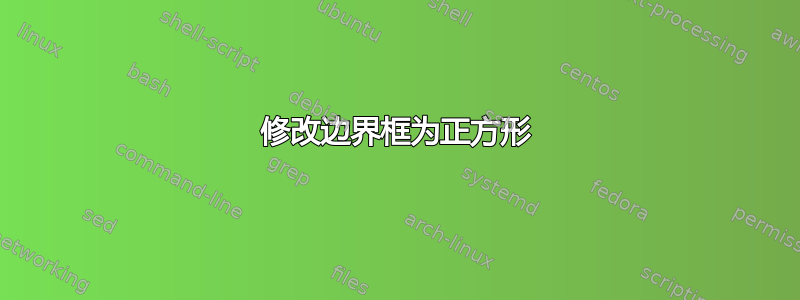
我尝试将矩形边界框修改为正方形并放大 10%!我希望下面的逻辑能够工作,但报告了错误:
\documentclass[border=0pt]{standalone}
\usepackage{tikz}
\usetikzlibrary{calc,intersections}
\usetikzlibrary{backgrounds}
\begin{document}
\begin{tikzpicture}
%\tikzset{background rectangle/.style={fill=gray!20}, show background rectangle}
\tikzset{
save path/.code 2 args={
\pgfkeysalso{#1/.estyle={insert path={#2}}}%
\global\expandafter\let\csname pgfk@\pgfkeyscurrentpath/.@cmd\expandafter\endcsname
\csname pgfk@\pgfkeyscurrentpath/.@cmd\endcsname
\pgfkeysalso{#1}%
}
}
\coordinate (O) at (5,5);
\foreach \i in {30,150,-30,-150} {
\begin{scope}[rotate around={\i:(O)}]
\coordinate (P) at (7.45,5);
\begin{scope}[rotate around={180:(P)}]
\draw[fill=white] (5.65,5) -- ++(1.8,1.5) -- ++(0,-1) -- ++(1.8,0)
-- ++(0,-1) -- ++(-1.8,0) -- ++(0,-1) -- cycle;
\end{scope}
\end{scope}
}
\path let \p1=(current bounding box.center),
\p2=(current bounding box.east),
\p2=(current bounding box.north),
\n1={max(\x2-\x1,\y3-\y1)*1.1},
\x3={x1-\n1},
\y3={y1-\n1},
\x4={x1+\n1},
\y4={y1+\n1}
in
useasboundingbox (\x3,\y3) rectangle (\x4,\y4);
\end{tikzpicture}
\end{document}
错误信息:
! Undefined control sequence.
\pgfmath@dimen@ ...men@@ #1=0.0pt\relax \pgfmath@
l.30 \n1={max(\x2-\x1,\y3-\y1)*1.1}
,
?
答案1
要增加边界框,您不需要任何这些。很可能有一种预定义的方法,但即使不打开 pgfmanual,您也可以这样做
\documentclass[border=0pt]{standalone}
\usepackage{tikz}
\begin{document}
\begin{tikzpicture}
\coordinate (O) at (5,5);
\foreach \i in {30,150,-30,-150} {
\begin{scope}[rotate around={\i:(O)}]
\coordinate (P) at (7.45,5);
\begin{scope}[rotate around={180:(P)}]
\draw[fill=white] (5.65,5) -- ++(1.8,1.5) -- ++(0,-1) -- ++(1.8,0)
-- ++(0,-1) -- ++(-1.8,0) -- ++(0,-1) -- cycle;
\end{scope}
\end{scope}
}
\path (current bounding box.south west) -- (current bounding box.north east)
coordinate[pos=-0.1] (sw) coordinate[pos=1.1] (ne);
\path[use as bounding box] (sw) rectangle (ne);
\end{tikzpicture}
\end{document}
抱歉,我读得不够仔细。是的,对于二次边界框来说,calc非常方便。
\documentclass[border=0pt]{standalone}
\usepackage{tikz}
\usetikzlibrary{calc}
\begin{document}
\begin{tikzpicture}
\coordinate (O) at (5,5);
\foreach \i in {30,150,-30,-150} {
\begin{scope}[rotate around={\i:(O)}]
\coordinate (P) at (7.45,5);
\begin{scope}[rotate around={180:(P)}]
\draw[fill=white] (5.65,5) -- ++(1.8,1.5) -- ++(0,-1) -- ++(1.8,0)
-- ++(0,-1) -- ++(-1.8,0) -- ++(0,-1) -- cycle;
\end{scope}
\end{scope}
}
\path[use as bounding box] let \p1=(current bounding box.south west),\p2=(current bounding
box.center) in (\p2) circle ({1.1*max(\x2-\x1,\y2-\y1)});
\end{tikzpicture}
\end{document}
为什么你的代码会出错?你把一些东西混在一起了(Paul Gaborit 也独立观察到了这一点),我修复了这些问题,最终得到了
\documentclass[border=0pt]{standalone}
\usepackage{tikz}
\usetikzlibrary{calc,intersections}
\usetikzlibrary{backgrounds}
\begin{document}
\begin{tikzpicture}
%\tikzset{background rectangle/.style={fill=gray!20}, show background rectangle}
% \tikzset{
% save path/.code 2 args={
% \pgfkeysalso{#1/.estyle={insert path={#2}}}%
% \global\expandafter\let\csname pgfk@\pgfkeyscurrentpath/.@cmd\expandafter\endcsname
% \csname pgfk@\pgfkeyscurrentpath/.@cmd\endcsname
% \pgfkeysalso{#1}%
% }
% }
\coordinate (O) at (5,5);
\foreach \i in {30,150,-30,-150} {
\begin{scope}[rotate around={\i:(O)}]
\coordinate (P) at (7.45,5);
\begin{scope}[rotate around={180:(P)}]
\draw[fill=white] (5.65,5) -- ++(1.8,1.5) -- ++(0,-1) -- ++(1.8,0)
-- ++(0,-1) -- ++(-1.8,0) -- ++(0,-1) -- cycle;
\end{scope}
\end{scope}
}
\path let \p1=(current bounding box.center),
\p2=(current bounding box.east),
\p3=(current bounding box.north),
\n1={max(\x2-\x1,\y3-\y1)*1.1},
\n2={\x1-\n1},
\n3={\y1-\n1},
\n4={\x1+\n1},
\n5={\y1+\n1}
in
[use as bounding box] (\n2,\n3) rectangle (\n4,\n5);
\end{tikzpicture}
\end{document}
请注意,我注释掉了save path,因为这个键已经预定义了。未预定义的(除非你加载库spath3)是use path键,可以在这里。(我不是历史学家,所以我不知道谁先有了它。)至于你的真正问题,你不能为 分配值,\x3比如说,只能为 等分配值。并且是 和 的坐标\n1,\n2等等。\x1\y1\p1





